Vaccine's emergency use in US feared to make residents Pfizer's 'clinical trial participants'
By GT staff reporters Source: Global Times Published: 2020/12/11 21:07:49 Last Updated: 2020/12/11 22:59:32
Emergency use to make residents Pfizer's ‘clinical trial participants’
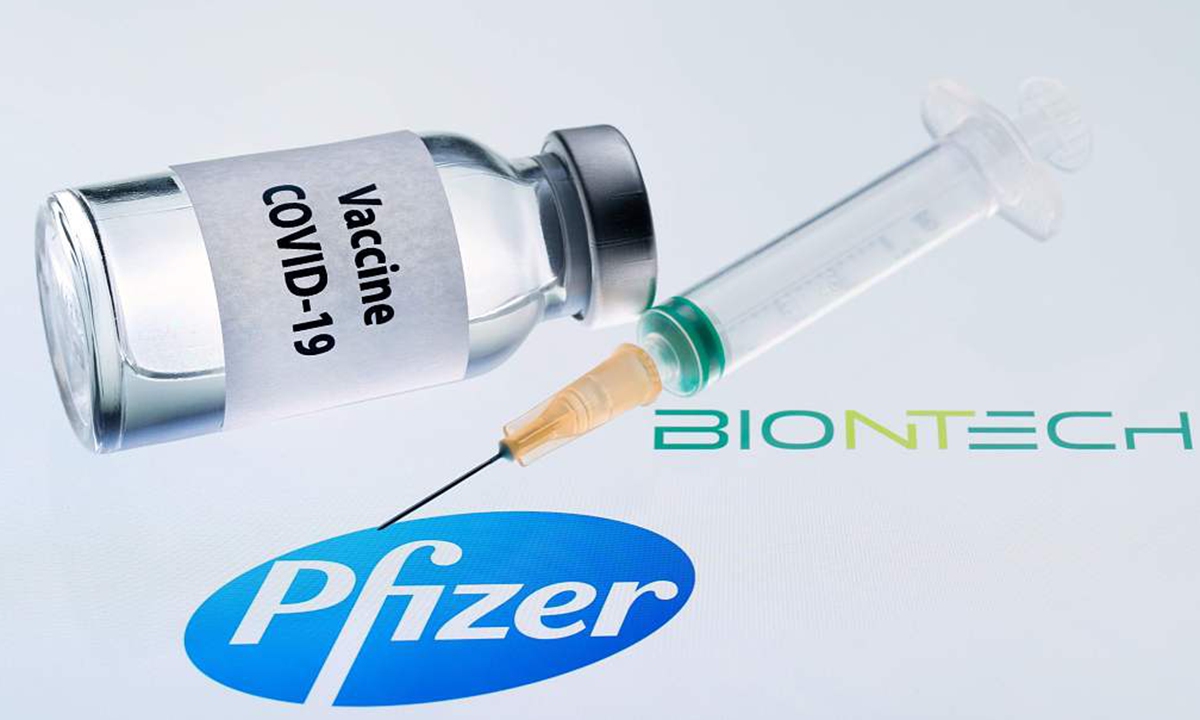
Photo:VCG
The US Food and Drug Administration is expected to soon authorize the emergency use of Pfizer's coronavirus vaccine, which will be another success of the US pharmaceutical giant after being given the green light in the UK and Canada.
However, doubts about the safety, severity of adverse reactions and whether it has been tested on enough people loom large.
Professionals including Chinese health experts, who suspect Western countries rushed the vaccine out of political and economic needs, said more detailed clinical and basic research from a larger number of participants on safety and effectiveness is necessary. Otherwise, the emergency use in countries like the US will make its residents Pfizer's clinical trial participants, they said.
A panel of FDA advisers voted overwhelmingly to endorse emergency use of the Pfizer/BioNTech COVID-19 vaccine on Thursday, and Reuters reported that the FDA is widely expected to authorize emergency use in days.
The authorization would kick off the largest vaccination campaign in the history of the US, which has the world's largest number of confirmed COVID-19 patients and highest recorded death toll.
"The final decision on whether to authorize the vaccine for emergency use will be made by FDA's career officials," the agency said in a statement.
The FDA staff said that the vaccine's efficacy and safety data met its expectations for emergency use authorization, Reuters reported.
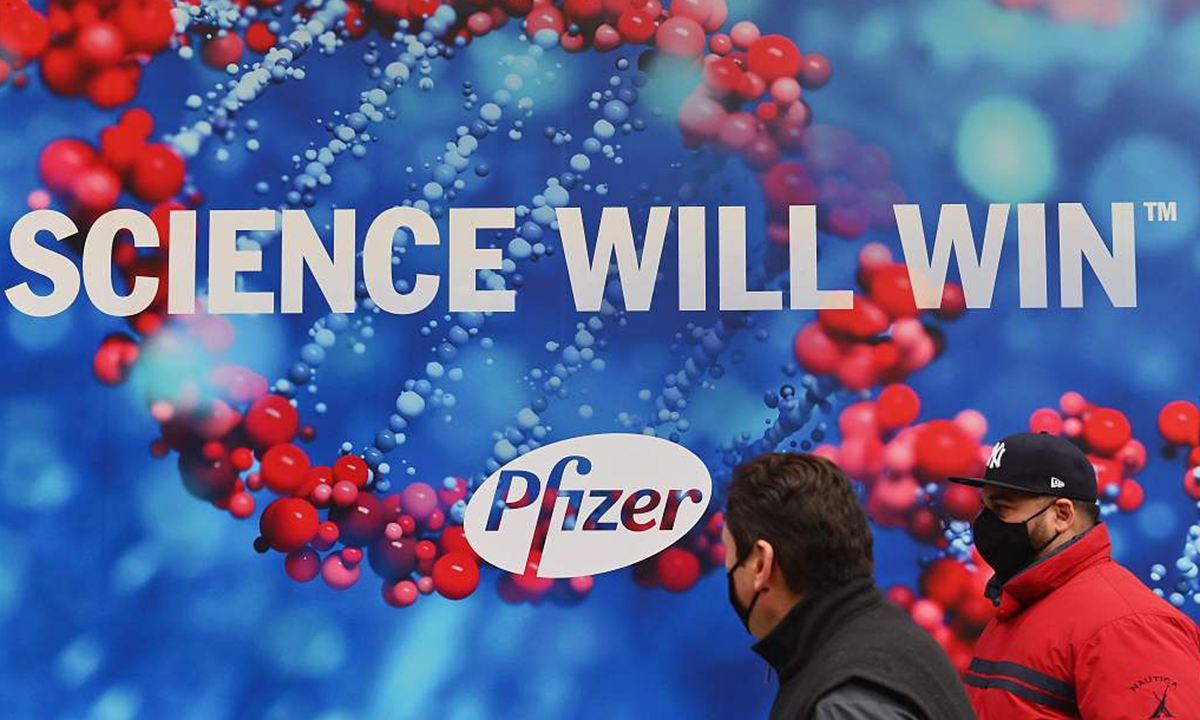
Photo:VCG
A vaccine is needed more than any time in the US as many hospitals have been running at full capacity since December, and doctors believe the post-Thanksgiving surge will lead to more widespread infections and record-setting deaths.
The mounting pressure for vaccines made some people worry whether the Pfizer/BioNTech COVID-19 vaccine has been rushed in Western countries.
In a series of interviews last week, Dr. Anthony Fauci questioned British regulators for rushing through the authorization process for a coronavirus vaccine, although he later backed off and said his comments came out wrong.
Some American netizens tweeted their concerns that only several months of trials may not be enough to find out the long-term side effects.
They rushed vaccines without sufficient testing because the economy "comes before humans as usual, despicable," one netizen named FisheyJay who lives in New York tweeted.
The Wall Street Journal said that much remains unknown about the vaccine because it has been studied only for several months. Typically, vaccines take years to develop and test before getting a green light.
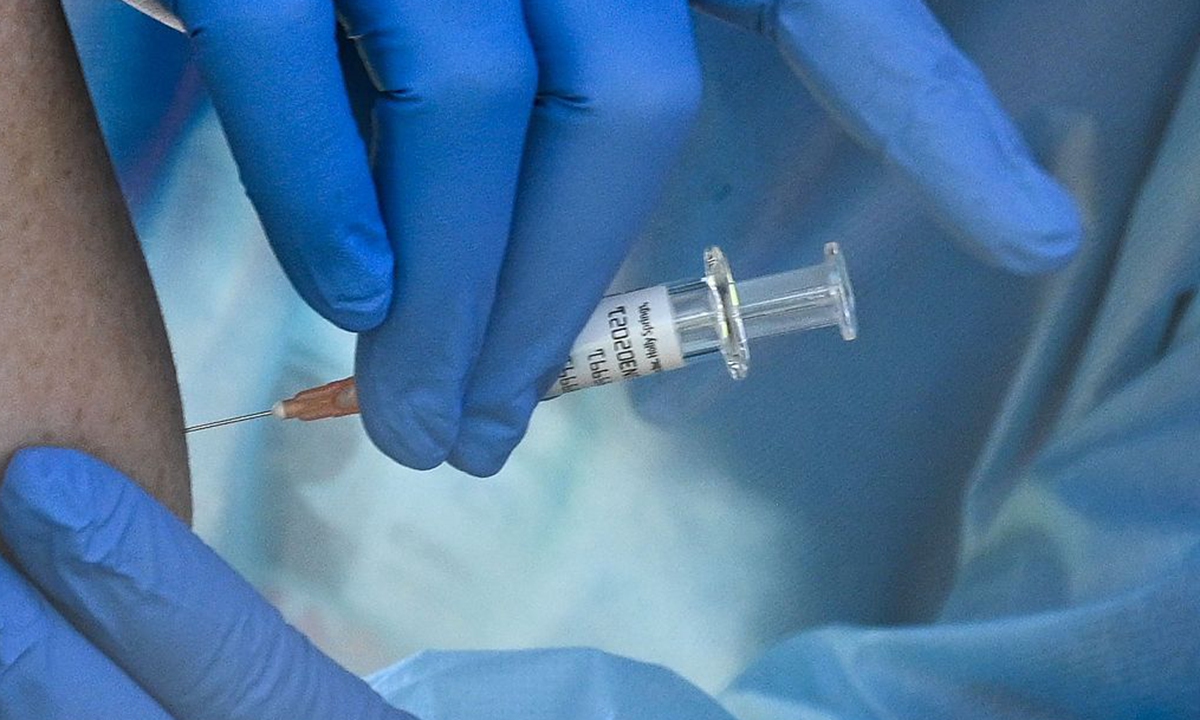
Photo:VCG
Chinese health professionals also raised concerns that as a vaccine uses a gene-based technology known as messenger RNA that has never been approved to prevent any infectious diseases, it requires more detailed clinical and basic studies.
"The late-stage trial of Pfizer enrolled some 44,000 people, and the number should be able to work for a well-developed traditional vaccine with a reasonable statistical design, but not enough for Pfizer's mRNA vaccine which is a completely new vaccine and the production technology is not mature," a Beijing-based immunologist told the Global Times on condition of anonymity on Friday.
More people are needed, and the exact number should be based on scientific calculations, the immunologist predicted that the total number enrolled should at least reach a million.
"The US emergency use would serve as a good clinical trial," he said.
Roughly 20 million Americans could be vaccinated in December, the chief of Trump administration's vaccine coordination program said in November.
Severity of side effects
The clinical trials of the Pfizer/BioNTech COVID-19 vaccine excluded pregnant women, which has sparked concerns from American health experts since November.
"Pregnant women are in the higher risk population, which makes thinking about a vax for them - it was already a pressing concern, but it's even more pressing," said Anne Lyerly, an obstetrician and bioethicist at the University of North Carolina at Chapel Hill's department of social medicine, the USA Today reported.
Thursday's FDA panel discussion chose to play down such concerns, by saying there was not enough data to support or contradict the use of the vaccine in pregnant women.
Dr. Gregory Poland, a virologist from the Mayo Clinic in Rochester, Minnesota, who previously served two terms on the FDA advisory panel, said he was surprised advisers did not voice more caution about pregnant women, Reuters reported.
Although the regimen is 95 percent effective, it has reported allergic reactions and side effects. Four Pfizer vaccine volunteers developed Bell's palsy, a condition that causes facial paralysis, after receiving the vaccine.
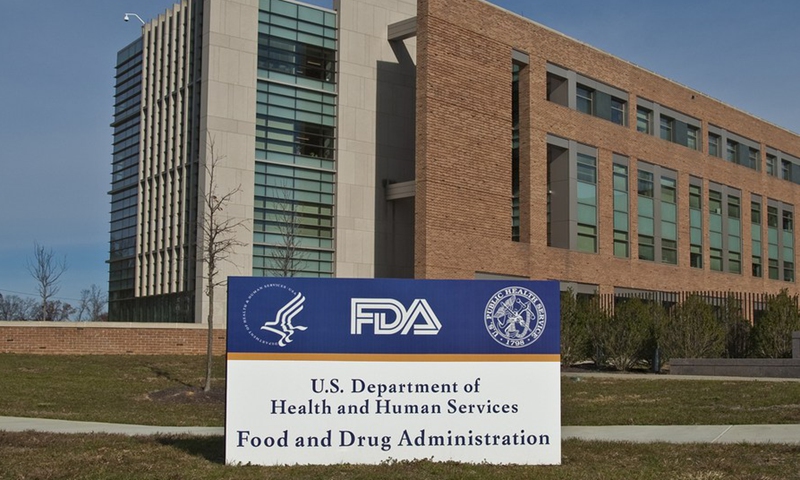
The headquarters of the US Food and Drug Administration (FDA) is seen in Silver Spring, Maryland, the United States. (Photo credit: FierceBiotech)
The FDA said in its report that the four cases in the vaccine group do not represent a frequency above that which is expected in the general population.
However, Tao Lina, a Shanghai-based vaccine expert, said he was a little worried about the incident as vaccines have been associated with Bell's palsy.
After the introduction of an inactivated intranasal influenza vaccine in Switzerland in 2000, 46 cases of Bell's palsy were reported, according to the New England Journal of Medicine.
A study in the journal suggested a strong association between the inactivated intranasal influenza vaccine used in Switzerland and Bell's palsy, and the vaccine was no longer in clinical use.
Tao told the Global Times that there is less need to worry about the risk of facial paralysis for traditional vaccines, but with the revolutionary mRNA vaccine, there should be more caution.
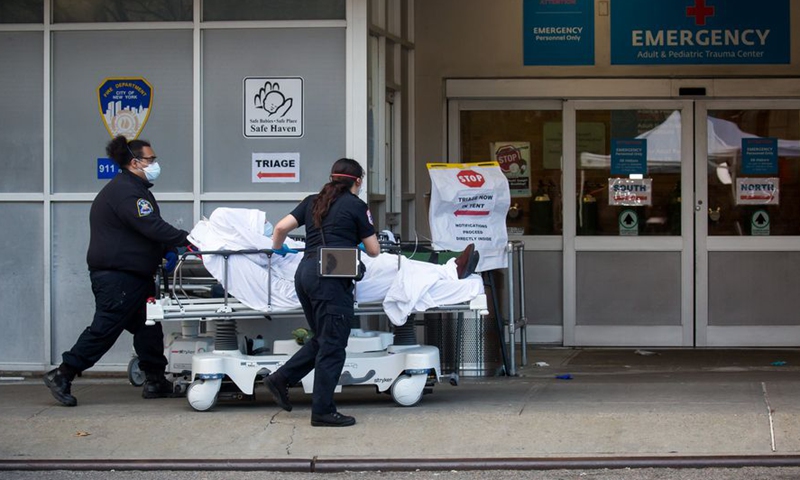
Healthcare workers bring a patient into the emergency room at Maimonides Medical Center during the coronavirus pandemic in the Brooklyn borough in New York, the United States, April 8.File photo:Xinhua
The FDA said four cases do not represent a frequency above that which is expected in the general population. But Tao said after calculation that if one more case of Bell's palsy was identified in the vaccine group, it would overturn the FDA's conclusion.
The FDA report also revealed that six people died during the Pfizer-BioNTech vaccine trials, and two of them died after receiving the vaccine. The other four were given a safe placebo.
None of the deaths were concluded to be related to the vaccine, according to Pfizer. The FDA said the deaths "represent events that occur in the general population of the age groups where they occurred, at a similar rate."
Neither Pfizer nor the FDA gave a detailed explanation to support their conclusion. The anonymous Beijing immunologist said that more research and information from people being vaccinated need to be made public.
So far, the clinical trials of the Pfizer vaccine were mainly conducted in summer and fall, as most of the participants were from the US, and the immunologist said that it lacks data from winter, when the virus spread more rapidly.
Fair distribution
For some people optimistic with the effectiveness of Pfizer COVID-19 vaccines, they are worried about the Trump administration's distribution ability.
Bill Gates said in November, "I am worried about vaccine distribution not going to the right people and not going at full speed," the Boston Globe reported.
He pointed out a lack of coordinated planning and forethought going into distributing the vaccine under the Trump administration.
Globally, rich countries including the US and Canada are hoarding doses of COVID-19 vaccines.
Countries representing 14 percent of the world's population have bought 53 percent of the most promising vaccines so far, according to the People's Vaccine Alliance - a network of organizations, including Amnesty International, Oxfam and Global Justice Now
The group said 96 percent of Pfizer's doses have been bought by rich countries.
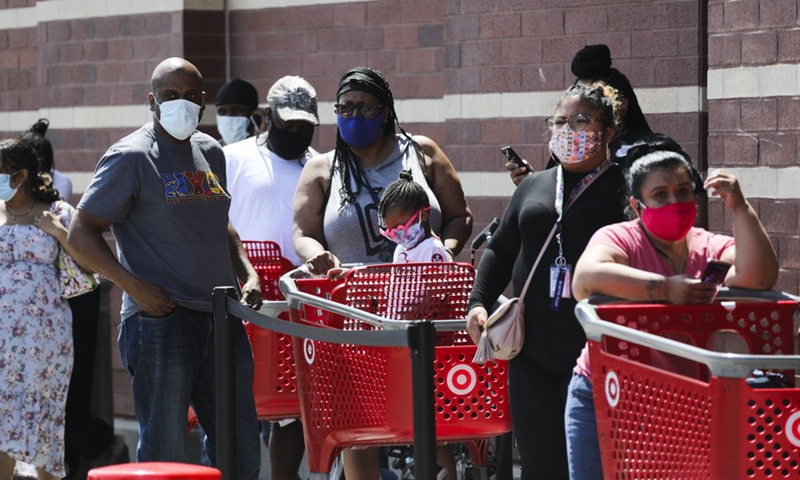
People line up to enter a department store in Brooklyn Borough of New York, the United States, on July 16.Photo:Xinhua
For people living in conflict areas, access to basic health services is often challenging or impossible. These populations are just as vulnerable to COVID-19 and deserve to be protected from this severe health menace, the International Committee of the Red Cross said in a statement sent to the Global Times. It estimates that more than 60 million people live in turbulent areas, and may not have the means to advocate for and procure the vaccine.
The Pfizer-BioNTech and Moderna products need to be stored at very low temperatures - minus 70 C and minus 20 C, respectively - which pose serious barriers to logistics in some underdeveloped countries, analysts said.
Due to their technological advantage and relatively easier logistics, Chinese-developed inactivated vaccines are being secured by more countries for their first dose. Many are pinning their hopes on the traditional vaccine type and expressed their confidence in its reliability.
But some Western media have been throwing shade at Chinese COVID-19 vaccines, claiming Chinese vaccine developers, including Sinovac, have not released efficacy data, and suspect that they may not be able to protect recipients as successfully as vaccines in the West.
In response to questions as to why China has not presented their trial data, Jiang Chunlai from Jilin University's School of Life Sciences said that Pfizer and Moderna conducted trials in countries where the virus is rife, which helps them gather efficient data on short notice.
"There is no need to follow the Western countries in releasing data. We have our own strict reviewing criteria and will cautiously conduct rounds of reviews before releasing them to the public," Jiang said.
As most of the clinical trials were conducted outside of China, China needs to transport the specimen back for testing. It also takes time, analysts said.
Newspaper headline: Doubts loom as US gears up for vaccination
Posted in: AMERICAS